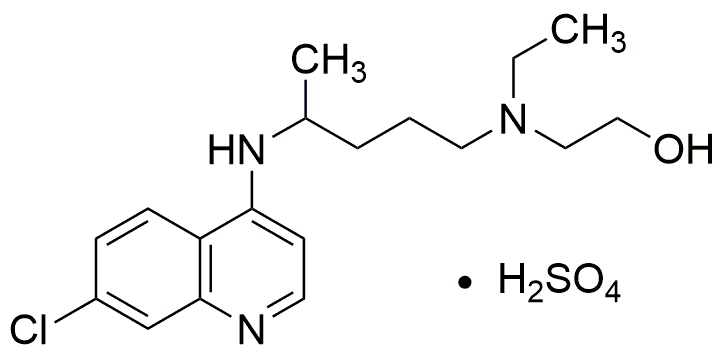Hydroxychloroquine sulfate is widely utilized in research focused on:
- Treatment of Autoimmune Diseases: It is primarily used in managing conditions like rheumatoid arthritis and lupus, providing relief from symptoms and improving patients' quality of life.
- Antimalarial Applications: Originally developed as an antimalarial drug, it continues to be effective in preventing and treating malaria, especially in areas with drug-resistant strains.
- COVID-19 Research: During the pandemic, it was investigated for its potential antiviral properties, leading to numerous studies assessing its efficacy against the virus.
- Cardiovascular Research: Studies have explored its effects on heart health, particularly its potential to reduce inflammation and improve outcomes in patients with heart disease.
- Drug Repurposing: Its established safety profile allows researchers to explore new therapeutic avenues, making it a candidate for repurposing in various diseases beyond its original uses.
General Information
Properties
Safety and Regulations
Applications
Hydroxychloroquine sulfate is widely utilized in research focused on:
- Treatment of Autoimmune Diseases: It is primarily used in managing conditions like rheumatoid arthritis and lupus, providing relief from symptoms and improving patients' quality of life.
- Antimalarial Applications: Originally developed as an antimalarial drug, it continues to be effective in preventing and treating malaria, especially in areas with drug-resistant strains.
- COVID-19 Research: During the pandemic, it was investigated for its potential antiviral properties, leading to numerous studies assessing its efficacy against the virus.
- Cardiovascular Research: Studies have explored its effects on heart health, particularly its potential to reduce inflammation and improve outcomes in patients with heart disease.
- Drug Repurposing: Its established safety profile allows researchers to explore new therapeutic avenues, making it a candidate for repurposing in various diseases beyond its original uses.
Documents
Safety Data Sheets (SDS)
The SDS provides comprehensive safety information on handling, storage, and disposal of the product.
Product Specification (PS)
The PS provides a comprehensive breakdown of the product’s properties, including chemical composition, physical state, purity, and storage requirements. It also details acceptable quality ranges and the product's intended applications.
Certificates of Analysis (COA)
Search for Certificates of Analysis (COA) by entering the products Lot Number. Lot and Batch Numbers can be found on a product’s label following the words ‘Lot’ or ‘Batch’.
Numéro de catalogue
Numéro de lot/série
Certificates Of Origin (COO)
This COO confirms the country where the product was manufactured, and also details the materials and components used in it and whether it is derived from natural, synthetic, or other specific sources. This certificate may be required for customs, trade, and regulatory compliance.
Numéro de catalogue
Numéro de lot/série
Safety Data Sheets (SDS)
The SDS provides comprehensive safety information on handling, storage, and disposal of the product.
DownloadProduct Specification (PS)
The PS provides a comprehensive breakdown of the product’s properties, including chemical composition, physical state, purity, and storage requirements. It also details acceptable quality ranges and the product's intended applications.
DownloadCertificates of Analysis (COA)
Search for Certificates of Analysis (COA) by entering the products Lot Number. Lot and Batch Numbers can be found on a product’s label following the words ‘Lot’ or ‘Batch’.
Numéro de catalogue
Numéro de lot/série
Certificates Of Origin (COO)
This COO confirms the country where the product was manufactured, and also details the materials and components used in it and whether it is derived from natural, synthetic, or other specific sources. This certificate may be required for customs, trade, and regulatory compliance.


